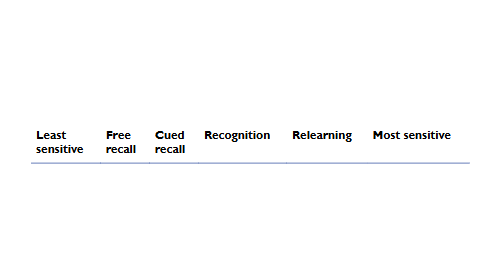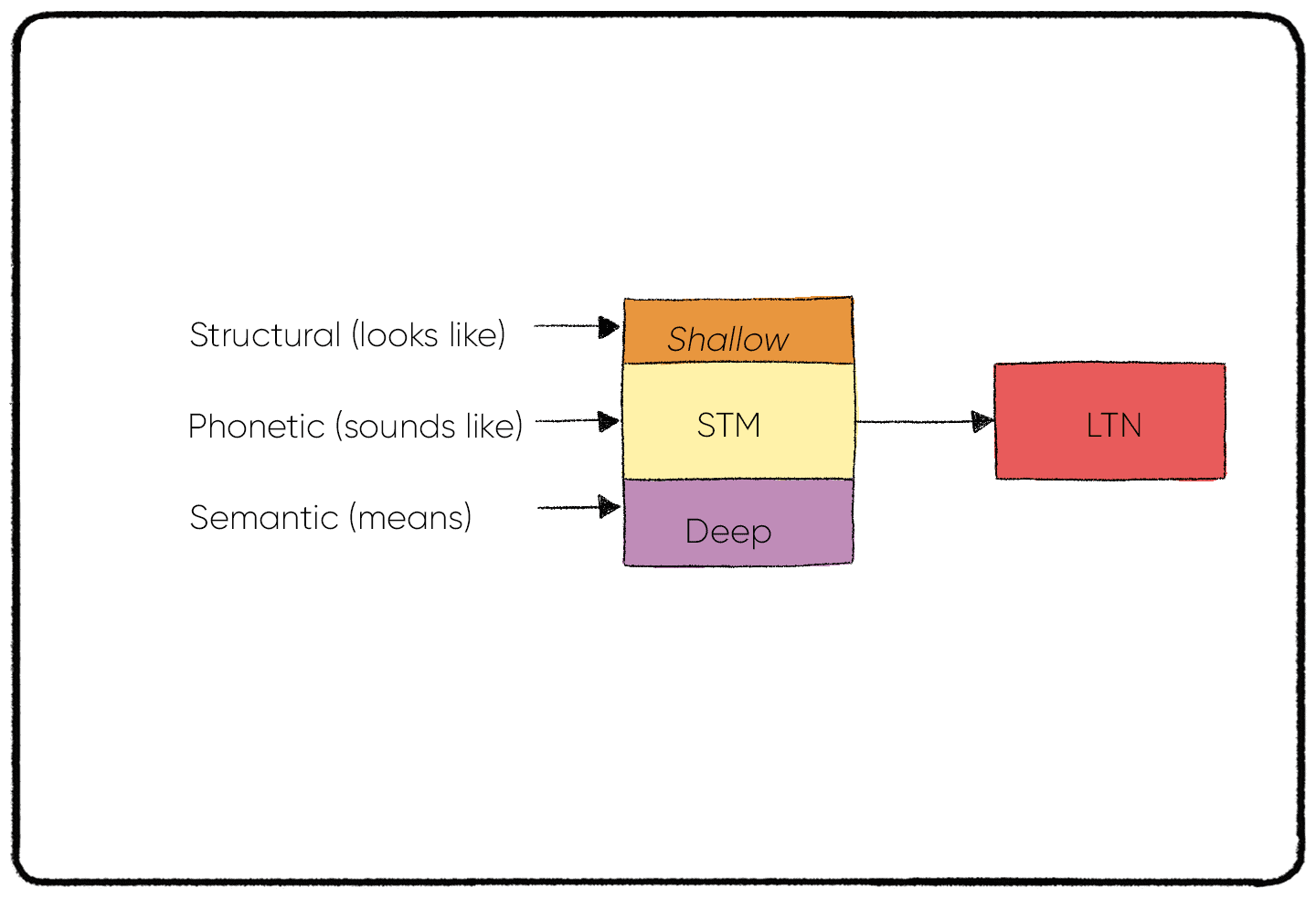psych - memory test + validation
1/43
There's no tags or description
Looks like no tags are added yet.
Name | Mastery | Learn | Test | Matching | Spaced | Call with Kai |
|---|
No analytics yet
Send a link to your students to track their progress
44 Terms
What is forgetting?
The inability to retrieve memories
What are the types of forgetting?
Retrieval failure
Interference - proactive and retroactive
Motivated forgetting
Decay theory
What is retrieval failure
The inability to consciously recall information stored in the long-term memory, due to an absence of retrieval cues
Theory proposed by Endel Tulving (Tulving & Tomson, 1973) and tries to explain why we are sometimes unable to remember material that we are certain is in our memory.
What are retrieval cues
Mental reminders or prompts that we create to assist our recollection later.
May be created deliberately or implicitly (or both)
Can come in a range of formats, including context-dependent where (environment) the memory was encoded, and, the smell, taste, and sounds associated with the memory
What is interference and the two types?
When information in the long-term store cannot be retrieved due to it being disrupted by similar information
Proactive and retroactive inteference
What is proactive interference?
When old information moves forward and interferes with our retrieval of newer but similar information
What is retroactive interference?
When new information interferes with the retrieval of older information stored in the LTM
Effect of similarity on retrieval
Interference is likely to be most pronounced when the two sets of material are very similar
Shown in McGeoch and McDonald where participants memorised words - they found that the amount of information forgotten from the original list increased as similarity increased.
What is motivated forgetting?
The intentional or unintentional suppression of memories or thoughts from conscious awareness to minimise emotional distress
Categories of motivated forgetting perform the same goal of forgetting memories to reduce anxiety
What is psychological repression?
Involuntary and subconscious process where memories are forgotten
What is thought suppression?
Deliberate and conscious effort to push certain thoughts and memories out of one’s conscious awareness - e.g. traumatic event
What is decay theory?
Suggests that memories fade over time and acknowledges that decay alone does not cause forgetting (additional process involved)
According to Atkinson and Shiffrin, information is transferred between memory stores and memory traces are left behind.
These traces disappear rapidly unless information is used quickly or actively rehearsed.
What is remembering?
The process of consciously (STM via retrieval) recalling or becoming aware of past experiences, information, or events.
What are the three methods of retrieval?
Recall, recognition, and relearning
What is recall?
Retrieving information from the LTM with minimal or no cues
Cues - stimulus that helps us retrieve memories
What are the three subtypes of recall - explain?
Free recall: retrieval of as much information as one can remember - no cues
Serial recall: retrieval of information in an order (series)
Cued recall: retrieval is assisted via cues
What is recognition?
Identifying wanted/correct information from a list that also includes unwanted/incorrect information
Yields more remembering than recall and is generally more accurate
Cued recall and recognition are confused: hints vs full answer
What is relearning?
Involves learning something that you have previously already learnt (committed to memory - especially with procedural memory)
Quicker learning the second time (due to savings score)
It is the most sensitive/successful method of retrieval
What is a sensitive task?
A more sensitive measure will register that a memory is present - even if only small amount of memory remains.
A less sensitive measure will only register that a memory is present when a large proportion of it remains.

What is the levels of processing model of memory, (Craik and Lockhart, 1972)?
Craik and Lockhart (1972) state that the strength and endurance of LT memories depend on the depth of cognitive processing
It is one explanation for why elaborative rehearsal more successfully transfers information from the ST store to the LT store (comparing to maintenance rehearsal)
Depth: meaning derived from stimuli
What are the two depths of processing?
Shallow and deep
However there is also moderate

What is Shallow processing?
Encodes physical information based on appearance; Involves structural and phonemic rehearsal
Maintenance rehearsal is used (to hold information for longer than 15-30 seconds in STM)
Shallow:
Structural: processing using physical appearance of the word
E.g.: pOTato, Brick, BOOK, Apple
20% recall
Shallow/moderate:
Phonemic: processing based on verbal sounds relating to a word
E.g.: bull, style, amazing, radio
50% recall
What is deep processing?
Semantically encodes/processes words by attaching meaning to them
Elaborative rehearsal is used
More success using deep processing comparing to shallow processing - as it links to information already in the LTM
Explain the Study: depths of processing
Craik and Tulving (1975) created a study: Depth of processing and the retention of words in episodic memory
What is the aim of the study?
To determine the impact the levels of processing have on the recall of memory
Briefly explain the method of the study
Participants: 60 male and female students recruited via convenience sampling (University of Toronto)
Materials: list of 60 words, a set of questions, and second list of 180 words
Design:
IV: type of encoding (structural, phonemic, semantic)
DV: number of words recalled
Briefly explain the procedure of the study:
Participants choose to take part in a study on perception (deception applied) and are randomly allocated into 1 of 3 conditions. All given a list of 60 words with corresponding questions
Questions are designed to fit either structural, phonemic, or semantic encoding, e.g. capital or lowercase, rhyming, and context in a sentence
Participants are then given a list of 180 words (no questions) and asked to recognise what words were on the list
Key findings of study?
Participants in the semantic encoding condition recalled a higher percentage of words than the participants in the structural and phonemic conditions
as semantic condition required deep processing (the structural/phonemic condition required shallow processing)
Percentage of recall:
Semantic: 80%
Phonemic: 50%
Structural: 20%
Contributions of study to psychology?
Provided empirical evidence which aspired further studies of a similar nature
The results were similar each time the study was repeated, therefore high in reliability
Criticisms/limitations of the study?
Ethical guideline of debriefing was violated (no evidence supporting that it wasn’t)
Unclear whether it was the depth of processing or time/effort that produced the results.
What are the two types of rehearsal strategies?
Maintenance and elaborative rehearsal
Rehearsal increases the time information is held within the STM store, providing the time needed for encoding to operate
What is maintenance rehearsal?
A strategy that keeps the information in our STM for longer than it’s 15-30 second duration
Occurs through repeating the information over and over - no meaning is added
Unlikely that information rehearsed will become encoded in the LTM store.
What is elaborative rehearsal?
A strategy that involves attaching meaning to information that the person wants to encode in their LTM
Successful encoding involves linking the new information with information already stored in the LTM - providing extra links to info in LTM
Due to making the information meaningful, we can create cues to later help retrieve this information from the LTM.
What is the role of repetition (Ebbinghaus 1885, forgetting curve)
Ebbinghaus (1885) results show that after learning, forgetting occurs rapidly for 20 minutes after, moderately for the remaining hour, and then gradually for 31 days
If the material is repeated/over-learnt it will be retained for longer
*Supports the decay theory
What is memory loss?
Any impairment in the ability to encode, retain, or retrieve information or experiences
What is CTE?
Chronic traumatic encephalopathy (trauma): progressive brain disease associated with repeated traumatic brain injuries that causes problems with cognition and memory.
Commonly associated with military combat due to exposure to explosive blasts, and sports, such as boxing, ice hockey, and rugby.
The degeneration of brain cells caused by CTE is thought to be related to the development of memory problems.
CTE’s impact on behaviour and emotion:
Behaviour:
Impulsive
Confusion (due to memory loss)
slurred speech
Emotion:
Symptoms of depression
Outbursts of anger
emotional instability (intense mood swings)
What is alzeihmer’s disease (AD)?
A brain disease (degeneration) that involves the degeneration of neurons in regions of the brain that are involved in cognitive skills, and memory formation + retrieval
Most common form of dementia
Degeneration is more prevalent in the hippocampus, amygdala, and cerebral cortex - all associated with memory, reasoning, and language processing.
What is the cause of AD (1-2) marks?
Neuron degeneration
What is the cause of AD (4-5) marks?
Neurofibrillary tangles, amyloid plaques and neuron loss.
Tau is a type of protein mainly found in the axon of dendrites of neurons which clumps together, breaking down the microtubule structure that supports the axon. This prevents normal neural transmission
Another protein, beta-amyloid is found in abnormally high levels of people with AD. They clump together between neurons and interrupt their functioning
What are the behavioural and emotional impacts of AD?
Behaviour:
Lost/disoriented
Habits may change
increasing in outgoing personality
Emotion:
Fearful/suspicious
anxious
abrupt mood changes
What is Wernicke-Korsakoff Syndrome (WKS) ?
A neurological disorder (drug induced) caused by a thiamine (Vitamin b1) deficiency
Leads to the degeneration of brain cells and is characterised by difficulties in forming new memories and retrieving stored memories
Degeneration of brain cells occurs in the thalamus, hypothalamus, and mamillary bodies
Chronic alcohol abuse (drug-induced) leads to a thiamine deficiency, then develops into WKS
What are the two stages of WKS?
Wernicke encephalopathy: severe yet reversible
Korsakoff Amnesic syndrome: chronic and irreversible
What are WKS impacts on behaviour and emotion?
Behaviour:
Ataxia (involuntary and rapid eye movements, slurred speech, poor coordination + balance)
Confabulation (stories to fill gaps)
Repeat same questions + stories
Emotion:
Frustrated
Apathetic
Anxious